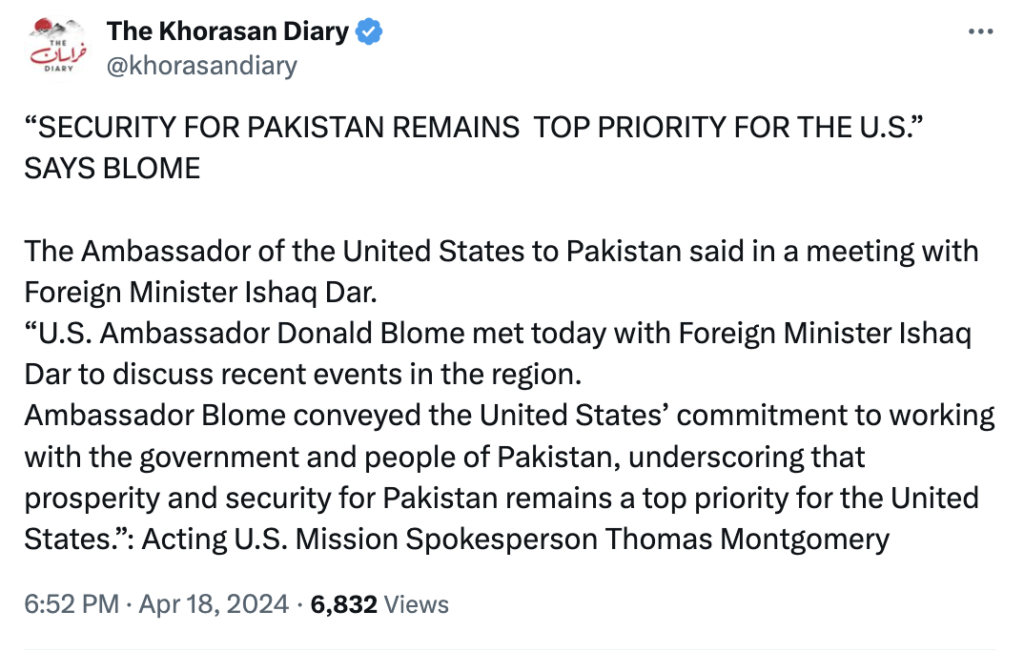American reassurances ring hollow when its narrow interests dictate undermining partners through a thoroughly hypocritical non-proliferation prism.
Targeting Pakistan’s ballistic missile program, the U.S. State Department has designated four (04) foreign entities under Executive Order 13382 for proliferating missile-applicable equipment and technology.
These are the four companies:
- Belarus’ Minsk Wheel Tractor Plant – Sanction
- China’s Xi’an Longde Technology – Sanction
- Tianjin Creative Source – Sanction
- Granpect Company
What do these companies offer Pakistan’s missile production framework
Belarus-based Minsk Wheel Tractor Plant has worked to supply special vehicle chassis to Pakistan’s long-range ballistic missile program. Such chassis are used as launch support equipment for ballistic missiles by Pakistan’s National Development Complex (NDC), which is responsible for the development of Missile Technology Control Regime Category (MTCR) I ballistic missiles.
People’s Republic of China (PRC)-based Xi’an Longde Technology Development Company Limited, has supplied missile-related equipment, including a filament winding machine, to Pakistan’s long-range ballistic missile program that we assess was destined for NDC. Filament winding machines can be used to produce rocket motor cases.
PRC-based Tianjin Creative Source International Trade Co Ltd has supplied missile-related equipment to Pakistan’s long-range ballistic missile program, including stir welding equipment (which the United States assesses can be used to manufacture propellant tanks used in space launch vehicles), and a linear accelerator system (which the United States assesses can be used in the inspection of solid rocket motors). Tianjin Creative’s procurements were likely destined for Pakistan’s Space and Upper Atmosphere Research Commission (SUPARCO), which develops and produces Pakistan’s MTCR Category I ballistic missiles.
PRC-based Granpect Company Limited has worked with Pakistan’s SUPARCO to supply equipment for testing of large diameter rocket motors. In addition, Granpect Co. Ltd. also worked to supply equipment for testing large diameter rocket motors to Pakistan’s NDC.
The Effect of The Sanctions
These sanctions block all U.S. property interests of the designated entities, prohibit transactions by U.S. persons with them, and signal Washington’s resolve to enforce non-proliferation regimes like the Missile Technology Control Regime (MTCR), even towards allies if warranted. The punitive measures could impede Pakistan’s strategic deterrent development, strain its ties with the U.S. and China, and compound its economic fragilities.
Just 24 hours after U.S. Ambassador Donald Blome met Pakistan’s Foreign Minister, Ishaq Dar, declaring Pakistan’s “prosperity and security” a “top priority” for Washington, the Biden administration has imposed harsh sanctions targeting Pakistan’s missile program. This blatant about-face demonstrates the duplicity and hypocrisy at the heart of American foreign policy.

The punitive measures designating Belarusian, Chinese and Pakistani entities under the Executive Order 13382 are a thinly-veiled attempt to undermine Pakistan’s strategic deterrent capabilities vis-a-vis India. As a nuclear-armed state, Pakistan has every right to develop and maintain a credible missile program to safeguard its security interests. Yet the U.S. has brazenly chosen to compromise those vital national imperatives.
The sanctions disrupt crucial supply chains for specialized equipment and technology required for Pakistan’s ballistic missile development at strategic organizations like the National Development Complex. This directly impedes Pakistan’s ability to counter the existential threat posed by India’s rapidly modernizing military capabilities, including its nuclear triad enhancements.
Washington’s overtly hostile stance against a purported “partner” nation is abject hypocrisy of its non-proliferation posturing. The U.S. regularly indulges the nuclear ambitions and vertical proliferation activities of its allies like Israel while ruthlessly targeting Pakistan’s indigenous deterrent development.
These sanctions are not about upholding any principled non-proliferation agenda, but rather reflecting American prejudices and strategic insecurities about enhancing Pakistan’s military capabilities and self-reliance. The attack on the missile program is inextricably linked to targeting Chinese entities — a direct assault on deepening Pakistan-China strategic ties that Washington views as a threat.
At a time, when Pakistan is firefighting its economic fragility and militancy challenges, the U.S. has chosen to capriciously undermine Pakistan’s security priorities and legitimate deterrence requirements. Coming just after Ambassador Blome’s appeasing overtures about Pakistan’s “prosperity,” these sanctions expose American duplicity at its worst.
Instead of prioritizing Pakistan’s stability as claimed, the U.S. has defaulted to a policy of incapacitating sanctions that compromise strategic programs vital for survival in a hostile neighborhood. This willful subversion of strategic equilibrium in the subcontinent vindicates Pakistan’s stance of insulating its core national security interests from American interference and coercion.
As Pakistan intensifies efforts for deeper geo-economic partnerships to offset such hostile measures, the world has been served another glaring reminder — American reassurances ring hollow when its narrow interests dictate undermining partners through a thoroughly hypocritical non-proliferation prism. The struggle to preserve its legitimate security rights continues unabated.
Hassan Saleem Awan is a management consultant, strategic communication professional and a former banker.








